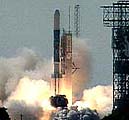 |
Washington DC, September 11, 1997 -  Washington DC, September 11, 1997 - Orbital Sciences Corp. of Dulles, Va. has won a $206 million U.S. Air Force contract award to build a new family of small expendable launch vehicles, the Air Force announced Sept. 10th. The new boosters will be designed using the first stages of retired U.S. Air Force Minuteman II intercontinental ballistic missiles. Orbital will use elements of its existing Pegasus XL winged rockets, plus the Taurus military booster to fabricate the new launcher family.
Washington DC, September 11, 1997 - Orbital Sciences Corp. of Dulles, Va. has won a $206 million U.S. Air Force contract award to build a new family of small expendable launch vehicles, the Air Force announced Sept. 10th. The new boosters will be designed using the first stages of retired U.S. Air Force Minuteman II intercontinental ballistic missiles. Orbital will use elements of its existing Pegasus XL winged rockets, plus the Taurus military booster to fabricate the new launcher family.Elements of the booster series may also incorporate Minuteman I and II upper stages, as well as a new upper stage under design by OSC that uses an all-liquid bipropellant rocket engine. Guidance systems and payload fairings will also be adapted from the Pegasus program to make up the rockets, which will be capable of lifting 300 to 800 lb. small U.S. military satellites and research platforms. The Orbital/Suborbital Program, or OSP Family of space boosters, will start flying in 1999 from the military rocket base at Vandenberg Air Force Base on the California coast, and will gradually build to six launches per year. OSC may eventually fly a total 24 missions of the new vehicles by the year 2004. The win by Orbital comes less than a week after the firm snagged a related Air Force contract, valued at $20.7 million, to launch a suborbital research mission for a U.S. Navy antimissile project using excess missile units. That award could also grow to include five additional missions as well. Together, the Air Force contracts strongly bolsters OSC's place as a provider of small satellite launch services. The company's Pegasus XL winged rocket has been flying payloads of up to 1,100 lbs. into low Earth orbits since April, 1990. The related Taurus military vehicle, which can lift up to 3,700 lbs into low orbit, has flown but once since 1994 but is set for a second space mission, with a Navy research spacecraft, later this fall. Orbital will build the OSP launchers at its Chandler, Arizona manufacturing plant. That facility, once part of OSC's Space Data Corp. division, was used extensively on military Sounding Rockets in the 1960's and 1970's. Space Data also built the Loki motors that was used by the U.S. Army 40 years ago this coming January to orbit the first U.S. satellite into space, Explorer 1. The firm, which became part of OSC in 1988, also had extensive experience with the Air Force. It designed the reentry system for the original Minuteman I missile thirty years ago. Pegasus and Taurus compete directly against Lockheed Martin's LMLV-1 and 2 launch vehicles, as well as the Russian Rokot and Kosmos vehicles. Although the OSP family will only be able to fly military spacecraft, the operational experience will strengthen OSC's overall commercial space launch industry position. The company is also developing the X-34 reusable winged launcher for NASA. CommunityEmail This Article Comment On This Article Related Links Space
 Calcutta, India (SPX) Dec 28, 2005
Calcutta, India (SPX) Dec 28, 2005The successful launch Thursday of India's heaviest satellite from spaceport of Kourou in French Guyana may have boosted the country's space research efforts to yet another level, but it has also lifted the spirits of at least three Direct-To-Home televisions broadcasters, one of which has been waiting for years to launch its services in India. |
|
|
|
|
|
|
|
|
|
|
|
|
|
| The content herein, unless otherwise known to be public domain, are Copyright 1995-2006 - SpaceDaily.AFP and UPI Wire Stories are copyright Agence France-Presse and United Press International. ESA PortalReports are copyright European Space Agency. All NASA sourced material is public domain. Additionalcopyrights may apply in whole or part to other bona fide parties. Advertising does not imply endorsement,agreement or approval of any opinions, statements or information provided by SpaceDaily on any Web page published or hosted by SpaceDaily. Privacy Statement |